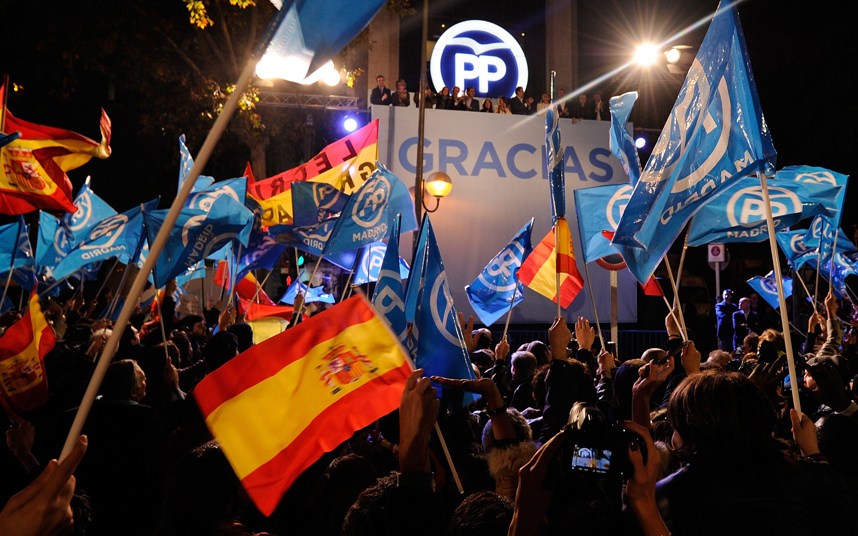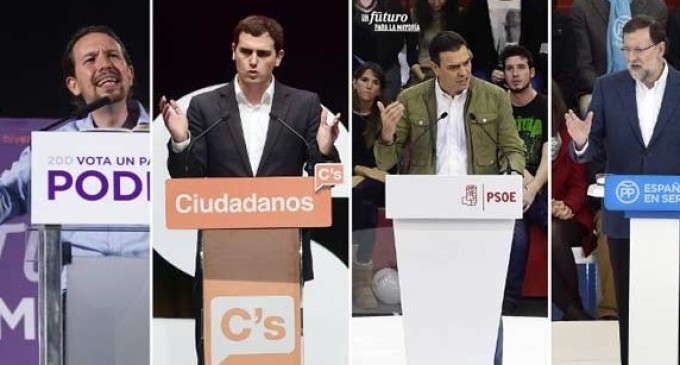
Popular Party supporters celebrate in Madrid, Spain Photo: Denis Doyle/Getty Images)
Written by Yulia Vladimirova; Originally appeared at A-specto, translated by Borislav exclusively for SouthFront
The Conservatives win, but without a large majority. For the second time in half a year, Spaniards voted to try and end the worst political crisis in the country’s modern history. Responsible for the new elections to occur after those in December, is the winner Mariano Rajoy of the conservative Popular Party, who showed reluctance and a lack of will to negotiate with the other parties. On the other hand, the left coalition in Spain is disappointed with its third place, after the Spanish Socialist Workers’ Party. Besides the demonization of “Podemos” by Rajoy as a terrible radical party, we also have to take into account the aftershock of the referendum in the UK last week.
Conservative Prime Minister Mariano Rajoy won over 30 percent of parliamentary seats, that is to say, 137 MPs. “We won the elections and we want to manage,” stated Mariano Rajoy, the acting Prime Minister of Spain during his victory speech after the elections in Madrid.
36.5 million Spaniards voted, and among them 200,000 who exercised their right to vote for the first time. Many Spaniards, however, stayed home and did not go to the polls because they were disappointed by the candidates. The elections in Spain had a record low turnout, the lowest since the death of Francisco Franco in 1975. The outcome of the elections will make the formation of a stable government even more difficult.

There’s a reason for the unsuccessful result for “Podemos” and that is due to the tactics in the campaign of Rajoy, where he did everything possible to awaken fear in the people of the radical left and to cause moderate to concentrate their votes to his party. This has led to the loss of eight of his future government partners. The liberals from Ciudadanos has taken over positions everywhere in Spain. Their chairman Albert Rivera united with the Socialists in May for a reform program. Because of corruption scandals, however, he called for the resignation of Rajoy. Now he again admits that he would fight corruption and will require reforms. “We are not here for everything to remain the same” Rivera said on election night, which means that he can go in opposition.
If the members of “Podemos” can draw the right conclusions from the results of Sunday’s election, this loss can only make them stronger. Some preliminary surveys showed that the struggling against the policy of austerity new leftist party, arising from the protest movement of the “Indignant” may surpass the traditional social democratic Spanish Socialist Workers’ Party. But the aging Spanish population changed expected forecasts in another direction.
Unidos Podemos, or the alliance of “Podemos” and the former Spanish Communist Party, the so-called United Left, failed in its objective to multiply the votes of each of the parties separately, which were given in December.
Dirty corruption scandals and four years of imposed by the Troika austerity measures, do not seem to have great importance for 33% of Spaniards who decided to vote moderate, conservative, and to preserve the status quo. Because of these voices the Popular Party proved invincible. And of course, because of the fear that the whole campaign of Rajoy, who sought to demonize and discredit the leader of the “Podemos” Pablo Iglesias and their platform to change the EU system as “uncertain”. So the Spaniards chose the “safe status quo” and smashed to pieces the hopes of many Europeans that after the failure of SYRIZA, “Podemos” would launch democratic reforms in Spain and the EU, and oppose the implementation of the neoliberal dictatorship.
It was during the reign of Mariano Rajoy, that one of the fastest developing countries in the Eurozone, Spain went to the edge of collapse with a very high unemployment rate. The neoliberal policy followed by Rajoy has even a darker side, which is not mentioned in his campaign. Which is that Spain is a country in Europe with one of the larges discrepancies in per capita income, with less security for workers, and many uncertain jobs for unskilled labor. However, the Spaniards again bask in the rose colored tales of Rajoy. But his success can not be understood without taking into account a very important thing: fear.
48 hours before the elections in Spain, a gift from the heavens descended to Rajoy: the referendum in Britain. The shock of it, immediately affected the Spaniards. The Stock Exchange suffered one of the strongest one-day declines, and the day when Cameron announced plans to resign, Rajoy send a message that people should be calm about the state of the markets. If nothing else, Rajoy has close links with the markets. His finance minister Luis de Guindos is a former director at Lehman Brothers. We should acknowledge that “Podemos” failed to act quickly and calm people down from the fear of collapsing markets.
In the beginning “Podemos” not only criticized the lack of sovereignty of Spain from Brussels, but also urged not to pay the “illegal parts” of state debt. This measure was later called debt restructuring. Therefore, the possible government of “Podemos”, would cause shock and horror to market fundamentalists.
The relationship between Brexit-and Britain and the backed by “Podemos” referendum on the secession of Catalonia also played a bad joke on the radical left. “Podemos” always said that Catalonia should remain a part of Spain, but that they respected the demands for self-determination of the population. So quite predictably, the winners of the elections in Spain took advantage of the fear and the impact of Brexit.
But no one said that the path to the Spanish Parliament is dotted with flowers. “Podemos” failed to take power, despite the state of crisis and the need for immediate radical measures required by the Spain right now. A party build from scratch, that wants to be able to take power in Madrid in just two years, is a very ambitious goal, even if for a moment we had all believed it could happen. “Podemos” can still offer models for radical progressive policy to fight the austerity measures implemented by the European institutions. The results on Sunday were a major blow. They showed that Spain is no different from everywhere else on the continent; fear takes over. But if members of “Podemos” manage to make the right conclusions from this defeat and rethink their mistakes and successes, it will only make them stronger. They will certainly need new energy and new enthusiasm to defeat Rajoy and his neoliberal allies, and to continue the fight for the soul of this crumbling Europe.






So how is financialist oligarchy and its controled “democracy” working for you, Spain? All these corrupt and incompetents will not be removing themselves from political and financial power on their own, now are they? As long as you are apathetic and let them do what they do, things will only be worst.
The answer is that they will need encouragement to do just that!